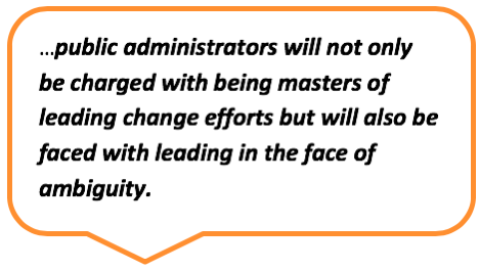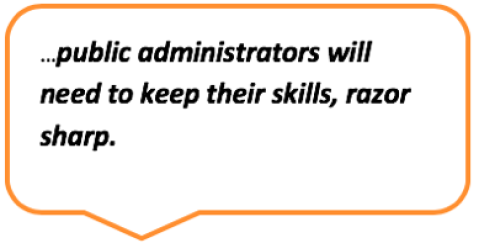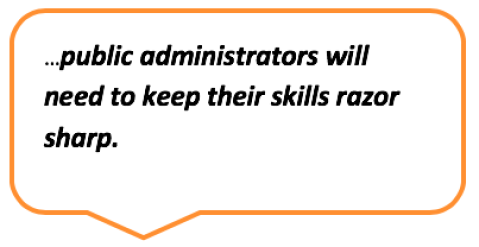Widgetized Section
Go to Admin » Appearance » Widgets » and move Gabfire Widget: Social into that MastheadOverlay zone
What Skills Are Important for Future Public Administrators in This Fourth Industrial Revolution Era?
The views expressed are those of the author and do not necessarily reflect the views of ASPA as an organization.
By Alexis T. Brown
March 3, 2019
What skills will be essential with the onset of the Fourth Industrial Revolution? This is a prevalent question that will equip future public administrators. According to the World Economic Forum, future jobs will require skills beyond critical thinking, creativity, communication and collaboration. Future workers’ skill sets must heighten if they are going to be effective, given the breadth and depth of this revolutionary period.

In brief, the Fourth Revolution Industry is the beginning of the era marked with the development of self-driving cars and intelligent robots. The pace of this change is exponential rather than linear as in the previous three revolutionary periods. During the first three periods, we harnessed the power of steam, mass-produced products using electricity, and saw the digital age of computers. Now, according to experts, this fourth revolutionary change is far more different and radical because tech advances have afforded experts to design and engineer the world. Change is happening so rapidly that jobs will disappear and new skills will need to be developed. The good news is that these advancing technologies will move humans toward skills such as creativity, emotional intelligence (including social interaction), collaboration, communication and flexibility to do work that machines cannot do. In the words of Alvin Toffler, the future will be for those that must, “…Unlearn and relearn.”
Realizing that change may continue at warp speed, public administrators will not only be charged with leading change, but also with leading in the face of ambiguity. Charting a path through uncertainty while achieving organizational growth and accomplishments will demand that public administrators have stellar social, emotional and communication capabilities to lead and manage both internal and external audiences. Demonstrating a high degree of emotional intelligence where public administrators effectively interact and network with staff and partners will be critical. No longer is establishing partnerships a good thing to do, but expected and necessary. The outlooks of managing across public-private relationships will soar to new heights where planning, executing and monitoring will be a joint venture.
Communication challenges that can persist in a diverse intergenerational workplace will need to be addressed and rectified. It will be essential for employees to realize each other’s strengths in order to assert their innovative ideas. Modeling active listening and assuring employees that they are heard and their creativity is valued will be important to maintain a productive, people-oriented and entrepreneurial environment.

Public administrators will be expected to lead talent identification and development efforts to bridge the skills gap. With that, they will need to anticipate future needs to determine the appropriate skills required of new employees while considering ways to retool existing employees. While this is the task set before any talent manager, the growth apparent during this beginning phase of the Fourth Revolutionary Industrial period will bring new focus to identifying current and prospective employees who are productive working in environments that are new and ever evolving. They must prepare and train staff for jobs that may disappear in the next five years.
With such a short turnaround time, public administrators will need to keep their leadership capabilities razor sharp. They will need to be excellent self-managers as defined by emotional intelligence. The self-management components of emotional intelligence, including self-awareness, self-regulation and motivation provides public administrators with an understanding of the attributes they require. Public administrators will need to have a deep understanding of their emotions, strengths, weaknesses, needs, and drives, and know how their feelings impact others and job performance. They will need to self-regulate by remaining open to change and being comfortable with ambiguity. They must question why things are done one way rather than another. They must not accept the status quo, continuously learn, rise the performance bar, remain optimistic even in the face of failure and be driven to achieve beyond expectations.
Given this advancing new phase, what skills are important for future public administrators in this Fourth Industrial Revolution Era? The World Economic Forum (2016) offers an answer with the top 10 skills essential for public administrators to have including:
- Complex problem solving.
- Critical thinking.
- Creativity.
- People management.
- Coordinating with others.
- Emotional intelligence.
- Judgement and decision making.
- Service orientation.
- Negotiation.
- Cognitive flexibility.
Author:Alexis T. Brown is a professor in the Masters of Public Administration program at Upper Iowa University (online). Alexis is a Frederick Douglas Fellow and has received the Women’s Educational Activist Award from the American Education Research Council, the Endelo Seeds of Change Award from Women Still Standing. Brown received a Lean Six Sigma Certification from Drexel University. As a scholar practitioner, Brown has over 15 years experience educating and training adult learners in the public and nonprofit sectors, building organizational capacities, leading change efforts, developing employees, and managing public-private relationships. She can be reached at [email protected]







 (4 votes, average: 4.25 out of 5)
(4 votes, average: 4.25 out of 5)
Richard Clay Wilson Jr.
March 8, 2019 at 4:05 pm
Unfortunately the contending political forces of our time care about just one thing, and that is who holds elective office. Because few politicians have time or opportunity for anything other than the next election, our institutions of government are suffering from a dearth of political leadership.
Because any action that attracts attention has the potential to offend one political faction or another, exercising administrative leadership is a risky proposition. The employees of government have every incentive to lay low and little incentive to exercise initiative. Political permission is a prerequisite to the pursuit of Professor Brown’s goals.